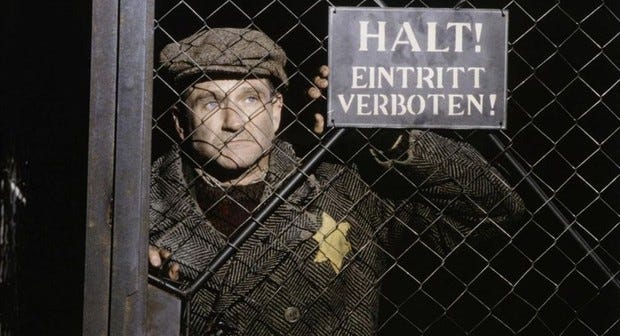Jakob the Liar (1999) Life is Beautiful with Robin Williams (vol.1)
“Stop torturing me. The Germans are already doing a fine job”

“Hitler goes to a fortune-teller and asks, “When will I die?”. And the fortune-teller replies, “On a Jewish holiday”. Hitler then asks, “How do you know that?” And she replies, “Any day you die will be a Jewish holiday”.
“Somewhere in Poland, 1944”, and with curfew approaching in half an hour we join “Jakob” (Robin Williams) on the cold, dark streets of the ghetto as his narration begins:
“So if you ask me as a Jew “How could you tell a joke like that at a time like that?”, that’s how we survived, and those were some of the things that kept us going. Everything else the Germans had taken. They built high walls covered in barbed wire to shut us in the ghetto. We were isolated from the rest of the world for years without any news. So we relied on the little things, a dark joke, a sunny day, a hopeful rumour. That’s why I would go and sit by the ghetto wall, and look at the tree where I first kissed Hannah.
And it was by that wall that it all started. With a single sheet of newspaper”
Throughout the above narration, director Peter Kassovitz has continually and slowly zoomed in on a melancholic Jakob sitting by the wall and to the tree where he kissed his wife for the first time before following the sheet of newspaper floating erratically on the wind and now over the wall, through the stop/start opening credits of the film and with Jakob now frantically chasing this single sheet of newspaper through the streets of the ghetto. Still floating on the wind, the single sheet floats high above the terraced housing before continuing through a tunnel between houses as we catch our first glimpse of the horrors to come. With Jakob in the foreground still chasing this sheet of newspaper for all he’s worth, in the background are four figures hanging from a wooden scaffold, a horror now seen up close as Jakob momentarily stops chasing the sheet of paper, overcome by the devastating image of human destruction before him. From the pancake shop Jakob used to own and run with his wife, the sheet of newspaper now continues to flutter on the wind as a circular camera captures his present day nightmare unfolding all around him as a train approaches the nearby station, black smoke billowing into the air.
As the opening credits conclude we cut away from Jakob for the first time and to the train seen briefly in the previous scene. Densely packed inside, with the train at a momentary standstill a father and mother peel back a wooden hatch in the floor for their daughter “Lina” (Hannah Taylor-Gordon) to escape. Frightened and unwilling to leave her parents, Lina huddles beneath the now moving train before collecting the family photograph dropped by her parents and now in the dead black of the night, Lina, a yellow star on the back of her dirty jacket, is all alone and outside of the walls of the ghetto. Inside, we return to Jakob following the sheet of newspaper until it nestles against a security fence dividing the ghetto from the Nazi Headquarters. With the newspaper finally within his grasp, Jakob is caught in a searchlight and after humbly confirming his name and an apology for being so close to both the security partition and the impending curfew time of 8pm, Jakob also stresses to the blinding light holding him prisoner in its glare that he hasn’t heard the curfew siren yet and still has time to return to his quarters. His pleas go unanswered and instead he’s ordered to present himself to the city’s Commandant and led through the security partition to the entrance of the Nazi Headquarters.
Inside the imposing building overlooking the ghetto, juxtapositions abound as Jakob walks the corridors alone. Screams of pain can be heard from one unseen room as we pass another housing a badly and bloodily beaten Jewish man as the sounds of the “Beer Barrel Polka”, a cheery and upbeat wartime anthem, waft from another as yet unseen room. Following the music, Jakob locates this via the radio in the Commandant’s office and after the camera switches our attention to first the ticking of a wall clock and the current time of 7.55pm and crucially, still 5 minutes before curfew, and then the Commandant’s desk filled with champagne and a vast array of half-eaten meals, German Armed Forces Radio returns with a special bulletin from the frontline and news that Russian forces are approaching the border town of Bezanika. Still alone, Jakob runs his finger along a wall mounted map of the region and with tears welling up in his blue eyes he smiles and announces softly: “They’re in Poland”.
Briefly cutting away and back to Lina walking along the train tracks leading toward the ghetto, carrying a small satchel and alone and in the darkest of nights, we immediately return to the Commandant’s office and “His Royal Highness” returning with his blonde haired mistress and wondering why Jakob is here, awaiting his arrival. “The sentry in the marketplace said I should come to your Royal Highness for my proper punishment” Jakob explains, before further and rather humbly exclaiming “with due respect” that he hadn’t heard the curfew siren because it isn’t past curfew yet. We cut to a close-up of the Commandant before a quick cut to the ticking of the wall clock and first 3 minutes to 8pm and then, 2 minutes to 8pm, as Jakob nervously breaks the tension with a joke and “Well, the sentry was just making fun of me” and, chuckling to himself if no-one else “Even in wartime we have practical jokes”. Lighting the Commandant’s cigarette nervously, he continues with a smile “We Jews are partial to jokes too” as the director switches our attention again to the ticking of the clock and now an air raid siren filling the streets below as the Commandant coldly urges Jakob to hurry back inside the ghetto before curfew.
Cast outside of Nazi Headquarters, the gates of the ghetto are locked shut as his request for a pass is ignored and alone and now, for the first time in many years perhaps, free of the walls of the ghetto that have contained him, Jakob is free but with nowhere to go other than finding a passage back inside his own prison. We return briefly to Lina but equally briefly back to Jakob hiding behind a train carriage talking to his dead wife as he whispers to himself “It’s crazy Hannah. I may be the only Jew for 400km trying to get back into the ghetto”. Searchlights sporadically cover the no-man’s land between a still hiding Jakob and the train tracks separating him from the wire mesh of the ghetto and whilst still talking aloud to his dead wife on his predicament, he’s startled by Lina slowly creeping up on him from behind as she asks if she can follow him into the ghetto. After reluctantly agreeing, Lina begins striding through the darkened no-man’s land without a care as she calls back to Jakob and asks if he’s scared? “No, terrified” is his honest answer before he slowly follows the tracks of the young girl ahead of him and after clambering to the barbed wire topped fence, sees Lina crawling through a gap way below him. “Thank you little mouse” he jokes as he follows Lina through the gap and as another black train chugs past in the background, billowing black smoke high into the night sky, they’ve entered the familiar streets of the ghetto safely and without capture.
We cut for a final time in the opening 13 minutes to Jakob and Lina walking the dark streets of the ghetto, first hiding from a curfew evading resident and then a small police unit clearing the streets. Here they hide inside an abandoned train carriage in the middle of the street and bidding his farewell as well as a thank you to the young girl for saving his life, Lina has nowhere to go and through childish smiles, pretends to be a train driver asking ghostly passengers where they’re going and where they wish to be dropped off. You have to go home announces Jakob sternly before asking the young girl “Where are you parents?”.
Lina’s smile dissolves at Jakob’s question to a face of sadness and sensing this, he cajoles the young girl to follow him, taking care not to be noticed through the streets of the ghetto, until they finally reach the sanctuary of Jakob’s dwelling…
So there you have the opening 13 minutes of Jakob the Liar and the first in a planned continuing series of articles on the films of the late and VERY great Robin Williams and “Life is Beautiful with Robin Williams” covering a raft of films on which I haven’t previously penned my rambling musings or cinematic thoughts. Robin’s final two films Boulevard and The Angriest Man in Brooklyn are up next on my cinematic slate but returning here to Jakob the Liar, whilst it was unfairly coupled with the far superior and Oscar winning Life is Beautiful from 1997, this film still has it’s own magical elements and largely down to the otherworldly genius from Chicago. Written by director Peter Kassovitz alongside Didier Decoin and based on the 1969 novel of the same name by Jurek Becker, I may be wrong but so much of the comedy, jokes and gags contained here have a feel of Robin’s touch to them, be they his response to Lina that tonight is Shabbat with “Great. We’ll fast like every other night” or his barber Kowalsky and his brilliant retort to Jakob of “If you hang yourself, I’ll kill you”. Yes it’s bleak and deadpan (and befitting of the film) but the gags are also quick, sharp, incisive, self deprecating and, as Jakob announces in the very first frames of the film, the kinds of jokes and “some of the things that kept us going”.
Not Robin’s greatest film or screen performance by any means (Dead Poet’s Society and Good Will Hunting are also, you’ll be unsurprised to learn, coming soon) but aided and abetted by Hannah Taylor-Gordon’s beautifully naive performance as “Lina”, Alan Arkin as “Frankfurter”, Liev Schreiber’s childlike portrayal of “Mischa” and particularly Bob Balaban as Jakob’s sparring partner in gags and offbeat comedic lines as “Kowalsky”, Robin brings the light to the darkest of shades as a heartbroken man who’s taken it upon himself to cheerlead his friends through the darkness.
And with his art imitating his life, I can’t think of a more appropriate way to end this first appraisal of the great man’s screen career.
Nanu! Nanu! Robin.
I miss you.
Thanks for reading. I hope this message in a bottle in The Matrix finds you well, prospering, and the right way up in an upside down world.
Whilst you’re here I may as well brag about the release of my trilogy of recently self-published books. Beautiful covers eh! As the title(s) would suggest, this is my life at the movies or at least from 1980 to 2024, and in volume 1 you’ll find 80 spoiler free appraisals of movies from debut filmmakers, 91 of the very best films appraised with love and absent of spoilers from 1990–2024 in volume 2, and in volume 3 you’ll find career “specials” on Paul Thomas Anderson and Quentin Tarantino together with the very best of the rest and another 87 spoiler free film reviews from 2001–2024.
All available in hardback and paperback and here are some handy links:
"A Life at the Movies Vol.1" - link to Amazon
"A Life at the Movies Vol.2" - link to Amazon
"A Life at the Movies Vol.3" - link to Amazon





